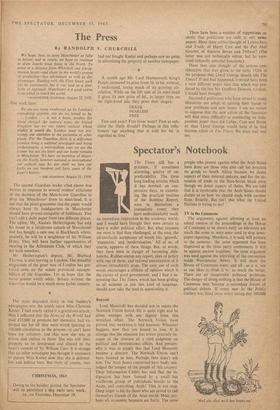The Press
By RANDOLPH S. CHURCHILL
We hope. then, to serve Manchester as fully as before; and in return, we hope to continue to draw benefit from being in the North. To stand at a distance from Whitehall and Throg- morion Street—and closer to the worlds centres of production—has advantages as well as dis- advantages. Hunting with the Fleet Street pack has its excitements but it can lead to a simi- larity of approach. Manchester is a good centre from which to watch the world.
-MANCHESTER GUARDIAN, August 22, 1959.
One week later:
We are not being swallowed up by London's centralising appetite, nor do we intend to be. . . . London . . is not a heart, sending life blood through the nation's veins, the United Kin,gdom has no one centre without whose vitality it would die. London must not pre- occupy our attention to the exclusion of other places. For the Guardian there is a difference between being a national newspaper and being predominantly a metropolitan one; we are the former but not the latter and our home remains in Manchester. We have no intention of desert- ing the North. however national or international our outlook may be. nor shall we turn our backs on one hundred and forty years of the paper's history. We are not being swallowed up by London's centralising appetite, nor do we intend to be. . . . London . . is not a heart, sending life blood through the nation's veins, the United Kin,gdom has no one centre without whose vitality it would die. London must not pre- occupy our attention to the exclusion of other places. For the Guardian there is a difference between being a national newspaper and being predominantly a metropolitan one; we are the former but not the latter and our home remains in Manchester. We have no intention of desert- ing the North. however national or international our outlook may be. nor shall we turn our backs on one hundred and forty years of the paper's history.
—THE GUARDIAN, August 31, 1959.
The second Guardian leader cited above was Written in response to several readers' criticisms of the decision of the Manchester Guardian to drop the 'Manchester' from its mast-head. It is sad that the pious guarantee that the paper would always have its headquarters in Manchester should have proved incapable of fulfilment. You can't edit a daily paper from two different places. The editor, Mr. Alastair Hetherington, has sold his house in a salubrious suburb of Manchester and has bought a new one in Blackheath where, quaintly, he will be a neighbour of Sir William Haley. They will have further opportunities of meeting in the Athenmum Club, of which they are both members.
Mr. Hetherington's deputy, Mr. Harford Thomas, is also moving to London. The dreadful magnetism of the great wen of London has pre- vailed even on the sedate provincial suscepti- bilities of the Guardian. Let us hope that the move proves worth while. Britain without the Guardian would he a much more feeble country.
The nit degraded story in last Sunday's newspapers was the attack upon Miss Christine Keeler. I had nearly called it a gratuitous attack; then I reflected that the News of the World had paid £23,000 to promote her memoirs; had ex- ploited her for all they were worth (putting on 100,000 circulation in the process—it can't have been my column); and that now she was in prison and useless to them. She was still their property to be denigrated and abused to the heart's content of Sir William Carr. It is strange that no other newspaper ,has thought it necessary
n to pursue Miss Keeler now that she is defence- less and behind bars. But then, of course, they had not bought Keeler and perhaps saw no point in advertising the property of another newspaper.
A month ago Mr. Cecil Harmsworth King's People increased its price from 5d. to 6d. without, I understand, losing much of its growing cir- culation. While on the left side of its mast-head it gives its new price of 6d., in larger type on the right-hand side they print their slogan: FRANK FEARLESS FREE Free and easy? Free from want? Free to sub- sidise the Daily Herald? Perhaps in this infla- tionary age anything that is sold for 6d. is regarded as 'free.'
There have been a number of suggestions re- cently that politicians are unfit to edit news- papers. Have these critics thought of Labouchere and Truth; of Harry Cust and the Pall Mall Gazette; of Aneurin Bevan and Tribune? (The latter was not technically editor, but he exer- cised indirectly editorial functions.) Have they also thought of the serious con- sideration that was given in the early 1920s to the proposal that Lloyd George should edit The Times? If this had happened, it would have been a very different paper than that which was pro- duced by the late Mr. Geoffrey Dawson. Livelier, I would have thought. . '
Successful politicians who have served in many Ministries are adept at turning their hands to new problems and new issues. I see no reason to suppose that the new editor of the Spectator will find more difficulty in conducting an inde- pendent paper than did Libby, Cust and Bevan or than Lloyd George would have if he had become editor of The Times. We must wait and see.






































 Previous page
Previous page